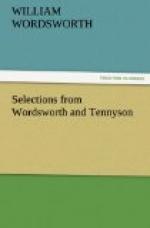The Lines Composed above Tintern Abbey contain the highest expression which Wordsworth has given to this thought, To the heedless animal delight in nature had succeeded a season in his youth when the beauty and power of nature “haunted him like a passion,” though he knew not why. The “dizzy rapture” of those moods he can no longer feel. Yet,
“Not for this
Faint I nor murmur; other gifts
Have followed, for such loss, I would
believe
Abundant recompense. For I have
learned
To look on nature, not as in the hour
Of thoughtless youth; but hearing oftentimes
The still sad music of humanity,
Nor harsh nor grating, though of ample
power
To chasten and subdue. And I have
felt
A presence that disturbs me with the joy
Of elevated thoughts: a sense sublime
Of something far more deeply interfused,
Whose dwelling is the light of setting
suns,
And the round ocean and the living air,
And the blue sky, and in the mind of man:
A motion and a spirit, that impels
All thinking things, all objects of all
thought,
And rolls through all things.”
In ll. 42-46, of The Influence of Natural Objects, we have an inimitable Wordsworthian effect. Into the midst of his wild sport the voice of Nature steals, and subdues his mind to receive the impulses of peace and beauty from without. We involuntarily think of the boy he has celebrated, his playmate upon Windermere, who loved to rouse the owls with mimic hootings, but
“When a lengthened pause
Of silence came and baffled his best skill,
Then sometimes, in that silence while he hung
Listening, a gentle shock of mild surprise
Has carried far into his heart the voice
Of mountain torrents; or the visible scene
Would enter unawares into his mind,
With all its solemn imagery, its rocks,
Its woods, and that uncertain heaven, received
Into the bosom of the steady lake.”
The Prelude, v. 379 f.
ELEGIAC STANZAS
COMPOSED 1805: PUBLISHED 1807.
Further references to John Wordsworth will be found in the following poems:—To the Daisy ("Sweet Flower"), Elegiac Verses in Memory of My Brother, When to the Attractions of the Busy World, The Brothers, and The Happy Warrior.
With lines 33-40, and 57-60, compare the Intimations of Immortality, ll. 176-187:—
“What though the radiance which
was once so bright
Be now for ever taken from
my sight,
Though nothing can bring back
the hour
Of splendor in the grass, of glory in
the flower;
We will grieve not, rather
find
Strength in what remains behind;
In the primal sympathy
Which having been must ever
be;
In the soothing thoughts that
spring
Out of human suffering;
In the faith that looks through
death,
In years that bring the philosophic mind.”




